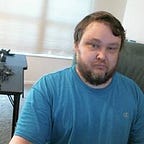Control: American Delusions
I, Dalton Lewis, am writing another book. Fancy that. I’m writing a book in which there is no magic, nor supernatural, nor sci-fi elements, at all. I wanted to write something real — something about people with real-world problems who still are wonderful people you, the reader, can grow to know, care for, and love. I just finished The Philosopher’s Guild — a book with 1,500 downloads and the first two ratings being five-stars. I loved writing a huge fantasy adventure piece but wanted to write something else. I wanted to write a teen horror in the vein of James Joyce.
I tried, really hard, to write a teen horror in the vein of James Joyce. Then I tried to read James Joyce, and I didn’t understand a word of it. Not a word. He wrote pages and pages about mundane things that symbolized other things, and I didn’t understand anything about what he was saying. So I scrapped the Joyce angle.
Then I started writing, and some of the characters really spoke to me. I didn’t want them to get butchered with a katana by a serial killer. I wanted most of my characters to live through the story. I didn’t like the slasher element that much anyway — it tends to get me bad reviews. So I scrapped the horror angle.
Then my mom told me that I should write more about all ages of people, and so I started to write about twenty-five to thirty years in the lives of my characters. My teen horror in the vein of Joyce was no longer a teen story, nor a horror story, nor was it in the vein of James Joyce.
There’s a murder, though. I tried — really tried, with all my being — to write a novel in which no one threw a punch or committed an act of violence, but I failed. I included the murder of a fifteen year-old because I thought it symbolized something — the murder of someone with potential, the silencing of an important voice, and something that would affect the characters.
The characters — they are Oliver and Amanda. They are writers. Oliver has few friends and little interest in the supernatural. He doesn’t care about fictional universes with lots of bad guys to be stopped. He has integrity, though — he does the right thing no matter what. He believes the worst in everything. He expects everything to go poorly no matter what. He writes realism, pure realism, and is a fan of watching sports. He stays awake for days and nights and days and nights. He has little interest in friends. He considers most people to not be the sort of people who he would want to be friends with. He is an antisocial outsider and a wonderful person.
Amanda is a kind and giving pretty person and a fearless geek. She is a whip-smart writer who believes that people have it pretty good in life. She has a solid group of friends who help and support her through her career in writing. She writes about superhero stories — a group of friends. Some stories include these friends saving the galaxy, and some stories include these friends having a casual holiday get-together to talk about their lives and their emotions. She writes about people and their interactions. She writes about people coming back from the dead — in her stories dead people come back. Oliver considers this the ultimate lie — death is final in the real world so it should be final in fiction, he thinks. She shows people what they want to see, and he shows them to brutal reality of life.
They may or may not be mentally ill. There may or may not be a murder that needs to be solved. There may be other complications as the story continues. I didn’t want it to be a mystery, per se, but there is an element of mystery to it. America and the way the culture treats its geeks and outsiders and young men and women — that’s the central conceit of the novel.
Ayn Rand was an influence in this one. I wanted to show a writer who didn’t follow along with the popular people, someone who disagreed with the rest of society and wanted to create a unique work of writing art. I wanted to show that young men can survive without society caring about them or noticing them. They can succeed even though society can fail to support or help them. That was an important concept for me in this book.
I wanted to write a book that I cared about. I had just finished The Philosopher’s Guild and gotten good responses, and I wanted to continue that trend. Let’s see if I can succeed.
Thanks, and take care, friends.
